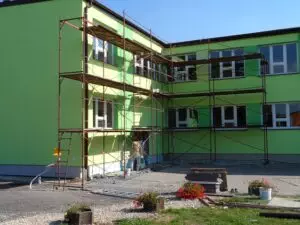Concrete foundation damage is a common household issue requiring expensive repairs, primarily caused by ground movement, water pressure, outdated construction methods, and improper drainage. Regular inspections are crucial for identifying issues early. DIY methods like hydraulic cement or epoxy injection work for minor problems, while complex issues need professional help using specialized equipment. Modern techniques use polymers and resins for cost-effective, durable repairs. Proactive maintenance through proper drainage and regular inspections prevents costly residential foundation repair down the line. Addressing small problems early ensures stability, safety, and financial security for years to come.
“The stability of your home begins with a solid foundation, but concrete foundations can suffer damage from various factors. This comprehensive guide explores cost-effective solutions for residential foundation repair, addressing common issues and offering practical advice. From small repairs to major restoration, learn how to evaluate foundation problems and make informed decisions. We dissect DIY capabilities, emphasize when to seek professional help, and provide strategies to prevent future damage. Discover the benefits of regular maintenance and invest in your home’s long-term stability.”
Understanding Common Causes of Concrete Foundation Damage

Concrete foundation damage is a common issue that many homeowners face, often leading to costly repairs. Understanding the root causes is the first step in preventing or mitigating such problems. One of the primary reasons for concrete foundation deterioration is ground movement caused by shifting soil and water pressure. This can result from poor initial construction, expansive clay soils, or changes in moisture levels. Over time, these movements can cause cracks, heaves, and settled areas in the foundation, leading to structural instability.
Another significant factor contributing to residential foundation repair needs is outdated or inadequate construction methods. Older homes might have been built with less robust materials or without considering modern building codes, making them more susceptible to damage. Furthermore, improper drainage around the home can lead to water accumulation against the foundation walls, causing cracks and erosion, especially in areas with high water tables. Identifying these issues early on through regular inspections is crucial for implementing effective and budget-friendly concrete foundation repair solutions.
Evaluating the Extent of Foundation Problems

Before diving into concrete foundation repair, it’s crucial to evaluate the extent of the problems at hand. This involves meticulously inspecting the foundation for signs of cracks, uneven surfaces, or any visible distortions. For residential foundation repair, start by assessing the size and pattern of cracks – hairline fractures may indicate minor settling, while wider gaps could signal more severe issues like structural damage. Pay close attention to corners, edges, and doors/windows that are out of alignment, as these often point to foundational shifts.
Consider the age of your home and local environmental factors, such as frequent earthquakes or heavy rainfall, which can accelerate foundation problems. If you suspect significant damage or cannot identify the root cause, consult a professional who specializes in residential foundation repair. They’ll provide expert assessments and recommendations tailored to your specific situation.
Cost-Effective Solutions for Small Repairs

When it comes to residential foundation repair, small issues can often be fixed without breaking the bank. For minor cracks or bulges, applying a hydraulic cement or epoxy injection is an effective and budget-friendly solution. These products are designed to fill and strengthen tiny gaps, preventing further damage. It’s an affordable alternative to more extensive repairs, making it ideal for homeowners on a tight budget.
For larger problems like settling concrete or uneven floors, lifting and stabilizing techniques can be employed. This process involves using hydraulic jacks to raise the affected sections back into place and install support beams. While it may require some professional assistance, this method offers significant cost savings compared to complete foundation replacement, ensuring your home’s structural integrity without a hefty price tag.
DIY vs. Professional: When to Hire Experts

When considering concrete foundation repair for your residential property, one of the most significant decisions is whether to tackle the job yourself (DIY) or hire professional experts. For minor cracks and surface-level issues, DIY methods can be effective and budget-friendly solutions. Many homeowners opt to fill small cracks with epoxy or apply topical sealers as a temporary fix. These approaches are suitable for aesthetic purposes but may not address deeper structural problems.
However, when it comes to more complex foundation repairs like heaving slabs, settling issues, or large-scale crack repair, professional involvement is crucial. Experienced foundation repair contractors have the specialized equipment and expertise to diagnose the root cause of the problem. They offer permanent solutions such as underpinning, piering, or slab jacking, ensuring your home’s structural integrity. While these services might be more expensive upfront, they prevent further damage and costly repairs in the long term, making it a wise investment for residential foundation repair.
Advanced Techniques for Major Foundation Restoration

In the realm of residential foundation repair, advanced techniques have emerged as game-changers, revolutionizing the way we address major structural issues. Modern methods go beyond traditional repairs, employing innovative strategies to ensure long-lasting stability for homes. One such technique involves the use of advanced polymers and resins, which can fill and strengthen cracks, effectively preventing further damage caused by moisture intrusion.
These cutting-edge materials offer a budget-friendly solution for extensive foundation restoration. By effectively sealing and reinforcing problem areas, they provide a durable fix without breaking the bank. This approach is particularly beneficial for homeowners looking to avoid costly replacement or complete foundation reconstruction, making it an attractive option for those seeking efficient and economical residential foundation repair solutions.
Preventive Measures to Fortify Your Home's Base

A robust and sturdy foundation is the cornerstone of any home, and preventing concrete foundation repair issues is a wise investment for homeowners. Regular maintenance can significantly extend the life of your residential foundation, saving you from costly repairs in the future. One of the first lines of defense is to ensure proper drainage around your house; this involves clearing debris from gutters and downspouts to prevent water accumulation near the foundation. Additionally, creating a slight slope away from your home’s base can help direct water away, reducing moisture levels at the foundation.
Another preventive measure is to inspect and repair any cracks or gaps in the concrete promptly. Even minor cracks can widen over time due to shifting soil, leading to more significant structural damage. Regularly checking for signs of settling or uneven floors is also crucial. Addressing these issues early on can prevent further complications, ensuring your home’s foundation remains strong and stable, thus avoiding extensive residential foundation repair procedures.
Long-Term Savings: Investing in Foundation Maintenance

Investing in regular maintenance for your residential foundation repair can lead to significant long-term savings. While it might seem counterintuitive to spend money on something often considered an afterthought, proactive measures prevent costly structural issues down the line. A simple inspection and minor repairs now can avert major disasters later, such as extensive concrete repairs or even the need for a complete foundation replacement, which can be prohibitively expensive.
By addressing small problems early, homeowners can avoid the financial burden of emergency repairs and the hassle of potential home uninhabitability. Additionally, maintaining your foundation enhances the property’s overall value, ensuring you reap the benefits when it comes time to sell. It’s an investment that pays dividends in stability, safety, and financial security for years to come, making it a smart choice for any homeowner concerned about their concrete foundation’s longevity.
